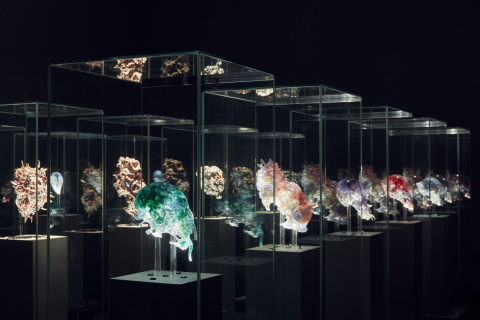Curated by Ewan McEoin, the ‘NGV Triennial’ exhibition at The National Gallery of Victoria in Melbourne, Australia is now open until 15 April 2018
Museum acquires Series 1 and 3 of Vespers, while Series 2 also on display at exhibition
MINNEAPOLIS & REHOVOT, Israel — (BUSINESS WIRE) — December 20, 2017 — Stratasys (NASDAQ: SSYS), a global leader in applied additive technology solutions, today announced that Vespers, a series of breakthrough 3D printed death masks designed and 3D printed in collaboration with Neri Oxman, has been acquired by the National Gallery of Victoria in Melbourne, Australia. The museum, which is the oldest and most visited gallery in Australia, hosts the inaugural ‘NGV Triennial 2017’ exhibition until 15 April 2018 – where the death masks will premiere.
This press release features multimedia. View the full release here: http://www.businesswire.com/news/home/20171220005638/en/

Installation view of Neri Oxman Vespers, Series 1 - 3, masks 1 - 5 2016 on display in NGV Triennial at NGV International, 2017. Photo Credit: Tom Ross
The NGV Triennial is a celebration of contemporary art and design practices, featuring the work of more than 100 artists and designers from 32 countries, including works from Yayoi Kusama, Xu Zhen, Guo Pei, Ron Mueck and Iris van Herpen, to name a few. The artists and designers were selected for their diversity and dynamism of practice, including those embracing cutting-edge technologies, from 3D printing to robotics. Highlighting some of the pressing issues being explored by artists and designers today, visitors will have an opportunity to contemplate the social, cultural, scientific and physiological questions of our contemporary world.
“For a Triennial that sets out to explore the interface between art, design, architecture, science, ecology and technology – Neri Oxman’s work could not be more fitting,” comments Ewan McEoin, Senior Curator of Contemporary Design and Architecture at the National Gallery of Victoria. “These 15 complex and intriguing objects offer a compelling conversation about past, present and future, delving into our psychological and cultural relationship to death and adornment, while speculating on the capacity of additive manufacturing to create, at a cellular level, new materials, medicines, and technologies that draw from nature and in-depth design research. Neri’s collaboration with Stratasys has enabled objects of beauty and profound intelligence.”
Debuted at London’s Design Museum in November 2016 to great acclaim, Vespers comprises 15 masks in three sub-series, portraying the past, present and future. The collection explores the themes of ancient traditions and future technologies and speculates about the preservation of life, both cultural and biological. Oxman, along with her team, led the creation of Vespers, which forms part of Stratasys’ ‘The New Ancient’ 3D printed art and design collection.
Oxman’s Vespers epitomize the theme of Stratasys’ The New Ancient Collection, which unifies historical crafts and designs of past civilizations with cutting edge technologies, to reimagine design in the modern world. The collection balances the dichotomy between the tribal crafted indigenous qualities with the bio technological advancement.
One of the primary sub-series of the Vespers collection, entitled ‘Past’, looks at historic origins, exploring life through the lens of death. Inspired by ancient masks, this sub-series utilizes five material combinations to emulate colors commonly found in cultural artefacts across regions and eras, with impressive accuracy. With the implementation of Stratasys’ unique J750 full-color and transparent multi-material 3D printing technology, Oxman’s team has created 3D printed objects that, for the first time in history, accurately reproduce the variety and nuance of ancient crafts.
“Vespers’ designs are entirely data-driven, digitally-generated, 3D printed, and – at times – biologically augmented,” Oxman explains. “By pushing the boundaries of cusp technologies – such as high-resolution material modelling, Stratasys’ full color multi-material 3D printing, and synthetic biology – they express the death mask’s deeper meanings and possible future use, thus bringing it back to life.”
The merging of molecular biology, ecological engineering, design computation and 3D printing led to the blurring of boundaries – between human and machine, between natural and designed environments – to the point where such distinctions can no longer be made. Oxman explains: “Vespers is the most sophisticated expression of our design approach so far, demonstrating that we can seamlessly vary the physical properties of materials in extremely high resolution that matches, and ultimately transcends, the scales of nature.”
Naomi Kaempfer, Creative Director of Art, Design and Fashion at
Stratasys concludes: “We don’t often get the opportunity to contemplate
the topic of life and death from within the discipline and perspective
of industrial design. The New Ancient collection from Stratasys
finds itself amid a technological era and consumeristic society,
emerging from the competitive trenches of research and development
moving towards the reigns of cutting-edge innovation. A subtle poetic
and sustainable hunger has risen to slow us down for just a moment, to
gaze deeply into the particles that compose the antique wisdom and
emotion of our human heritage, enabling us to cherish and bridge this
universal truth.”








